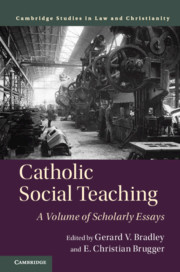Book contents
- Catholic Social Teaching
- Law and Christianity
- Frontispiece
- Catholic Social Teaching
- Copyright page
- Dedication
- Contents
- Contributors
- Acknowledgments
- Abbreviations
- Introduction Contingency, Continuity, Development, and Change in Modern Catholic Social Teaching
- Part I Historical Background
- Part II Leo XIII to Francis: The Documentary Tradition
- Part III Themes in Catholic Social Teaching
- 10 Catholic Social Teaching on the Common Good
- 11 The Universal Destination of the World’s Resources
- 12 The Apostolate of the Laity
- 13 Globalization
- 14 Are Some Men Angels? Modern Catholic Social Thought and Trust in Government
- 15 The Moral Principles Governing the Immigration Policies of Polities
- 16 International Finance and Catholic Social Teaching
- 17 Subsidiarity
- 18 Socialism and Capitalism in Catholic Social Thought
- 19 The Preferential Option for the Poor and Catholic Social Teaching
- 20 Catholic Social Teaching and Living the Christian Life
- Part IV Evaluative and Critical Reflections
- Bibliography
- Index of Names and Subjects
- Index of Ecclesiastical Texts
18 - Socialism and Capitalism in Catholic Social Thought
from Part III - Themes in Catholic Social Teaching
Published online by Cambridge University Press: 12 July 2019
- Catholic Social Teaching
- Law and Christianity
- Frontispiece
- Catholic Social Teaching
- Copyright page
- Dedication
- Contents
- Contributors
- Acknowledgments
- Abbreviations
- Introduction Contingency, Continuity, Development, and Change in Modern Catholic Social Teaching
- Part I Historical Background
- Part II Leo XIII to Francis: The Documentary Tradition
- Part III Themes in Catholic Social Teaching
- 10 Catholic Social Teaching on the Common Good
- 11 The Universal Destination of the World’s Resources
- 12 The Apostolate of the Laity
- 13 Globalization
- 14 Are Some Men Angels? Modern Catholic Social Thought and Trust in Government
- 15 The Moral Principles Governing the Immigration Policies of Polities
- 16 International Finance and Catholic Social Teaching
- 17 Subsidiarity
- 18 Socialism and Capitalism in Catholic Social Thought
- 19 The Preferential Option for the Poor and Catholic Social Teaching
- 20 Catholic Social Teaching and Living the Christian Life
- Part IV Evaluative and Critical Reflections
- Bibliography
- Index of Names and Subjects
- Index of Ecclesiastical Texts
Summary
This chapter offers a broad overview of the development of Catholic social thought on socialism and capitalism, together with novel interpretations of this tradition. Through a close engagement with magisterial documents, this chapter first provides an account of socialism as the founding heresy of the formal tradition of the social doctrine of the Church, aiming to distill the essence of the Church’s condemnation. It goes on to argue that capitalism is not a similar (but opposite) heresy since capitalism is not in essence an error about human nature and man's relation to created goods. The principles of right order are discussed in relation to capitalism, with the question of just wages receiving a prominent treatment. Finally, drawing on the "twin rocks" passage in Quadragesimo anno, the chapter provides a schema for thinking about the axis of philosophical mistakes related to socialism and capitalism. A brief treatment of private property in the final section is used to illustrate the common but faulty assimilation of individualism and collectivism to capitalism and socialism respectively. For the sake of tractability, this chapter focuses primarily on the development of the social magisterium in the Leonine era.
Keywords
- Type
- Chapter
- Information
- Catholic Social TeachingA Volume of Scholarly Essays, pp. 433 - 467Publisher: Cambridge University PressPrint publication year: 2019

